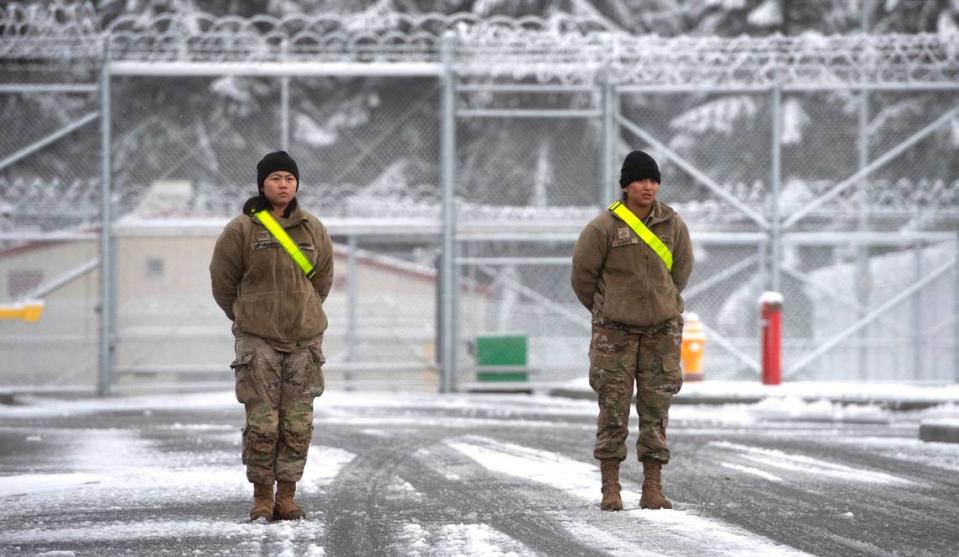Possible government shutdown this weekend: 10 questions, answered for WA state residents
The federal government is once again facing a potential shutdown. Lawmakers in Washington, D.C., have until midnight Saturday to come to an agreement and pass the annual spending bill through Congress. Otherwise, several governmental programs and agencies could come to a grinding halt nationwide.
A federal government shutdown would also impact Washington state. When Congress cannot pass the 12 appropriation spending bills, which includes money toward veteran affairs and defense funding, among other things, millions of federal employees and programs across the country are affected, from airport officials to national parks and food stamps.
Here’s what to know about a potential government shutdown in Washington state:
What is a government shutdown?
With each fiscal year, federal agencies need Congress’ permission to spend money and to pay employees. This is done through 12 appropriations bills.
This year, like in years past, Congress has reached a standstill in these legislative discussions. They have only a few days to reach an agreement before a government shutdown occurs after funding runs out at the end of Sept. 30.
A government shutdown would result in many federal workers not working or being required to work without pay. Once the government reopens, it’s a federal law to provide back pay to all employees who worked through the shutdown.
Will the post office be open?
Don’t worry about your packages and letters — the U.S. Postal Service will remain unaffected by the shutdown. USPS is self-funded and does not rely on taxpayer dollars, meaning the postal service continues functioning even though the government shuts down.
USPS funds itself primarily through selling stamps, packaging fees and other services that help the service function.
Will I get my government support?
Social Security checks will be unaffected by the shutdown.
Funding for SNAP and WIC programs is expected to deplete quickly. The USDA expects millions of people to lose access shortly after a shutdown.
Medicare/Medicaid and CHIP assistance programs are expected to continue unaffected.
Can I still visit national parks and other recreation areas?

National Park Service sites will close to the public in the event of a government shutdown, including national parks, museums and visitor’s centers. This also means Fat Bear Week may be canceled.
Will my food still be safe?
The U.S. Department of Agriculture is responsible for food inspections, primarily through the Food Safety and Inspection Service. Food inspections at facilities that produce meat, poultry, eggs and other essential items will continue; it’s unclear whether other food-processing facilities that produce non-essential items, such as ice cream and cereal, will be affected.
During the 2018-19 shutdown, the Food and Drug Administration temporarily stopped inspections at these non-essential facilities.
Will veteran’s services be available?
Most veterans’ services will continue if the government shuts down, including the Veterans Health Administration, which oversees over 1,300 health-care facilities nationwide, many of which are in Washington.
This means that Veteran Affairs hospitals will remain open and fully staffed, and TRICARE health plans will continue to operate as usual. Veterans will also continue to receive pension benefits, a monthly payment to qualifying veterans.
What about military bases?

Active-duty military members will continue to work but without pay. They have been deemed essential for national security. Transfers and transportation will be limited. Military members based at home will likely be furloughed.
How are airports affected?
Don’t stress if you have flights booked for early October — air traffic controllers and airport security screeners (TSA) are considered essential workers and will continue to work through a shutdown.
But you may want to get to the airport a little earlier. Despite being essential workers, they won’t get paid during the shutdown. During the partial government shutdown from December 2018 to January 2019, many TSA screeners called in sick rather than working unpaid hours, resulting in longer screening lines for travelers.
How does this impact tribal nations?
Many tribal programs and organizations will have to depend on emergency operating plans if the government shuts down. During the 2018-19 shutdown, some tribes reported losses of over $200,000.
Some of the programs that will rely on emergency operating plans, according to the National Congress of American Indians, include tribal law enforcement and courts, primary through higher education, tribal housing programs, and other programs for at-risk community members.
What isn’t impacted?
Several federal services will still operate, but employees won’t be paid. Full-time employees will make back this money after the shutdown, but contracted workers are not promised the pay. Expect limited services and delays within the following:
Food and Drug Administration
Airline employees
Congress
U.S. Treasury
U.S.P.S.

